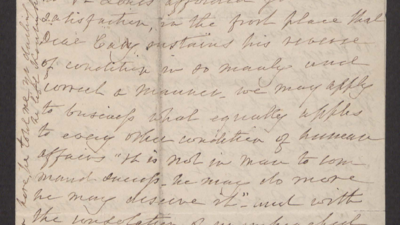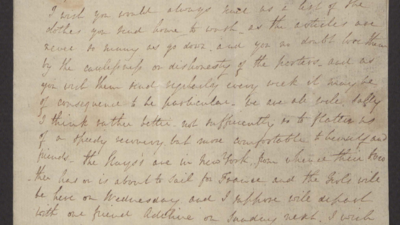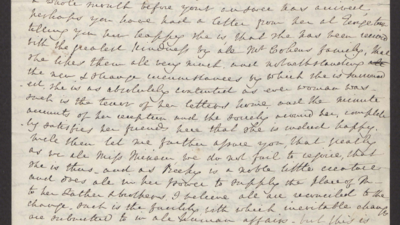Oral History Interview with Lillian Wishnefsky
Title
Date
Contributor
Summary
Lillian Wishnefsky, née Kupferberg, was born in Sosnowiec, Poland in December 1929. Her father was a merchant and her mother a professional pianist. Her family observed the Jewish holidays. She attended public school until fourth grade when Germany invaded Poland in September 1939. She describes the formation of the Sosnowiec Ghetto in 1941, the confiscation of her father’s factory, her clandestine education, life in the ghetto, her family’s move to the Srodula Ghetto; her mother obtained false papers and was hidden by Christians. She describes the Nazis taking her father in the middle of the night, murdering her grandparents and deporting her to a camp and later Auschwitz.
Even though she was only 12 ½ years old, she was not sent to the children’s camp in Auschwitz but was instead assigned to forced labor. Her barracks were across the street from the gas chambers. One and a half years later she was sent on the death march to Ravensbrück. She was part of a prisoner exchange arranged by President Roosevelt and traveled to Sweden via Denmark. She describes her experience on a Swedish farm and her move to Stockholm which was precipitated by a Swedish publishing company’s interest in her diary. She moved to the United States in November 1545.
none
More Sources Like This
of
Gertrude Hallo
Dr. Gertrude Hallo, nee Rubensohn, was a personal friend of Franz Rosenzweig. She talks about her and her husband’s association and personal relationship with Franz Rosenzweig, starting in 1910 through his final illness, when she learned to take dictation from Franz Rosenzweig who could only move part of one little finger. She explains why Franz Rosenzweig decided not to convert to Christianity but to devote his life to personal Jewish learning, and to improving Jewish education for children and adults. He strove to combine orthodox practice with liberal thought. She explains why one should focus on the man and his life, not on his philosophical system and his theological teachings.
Dr. Hallo talks about Rosenzweig’s life, work, major accomplishments, publications, and some of the well-known persons who studied with him. She describes how he was able to live and to teach after he was stricken with Amyotrophic Lateral Sclerosis. Franz Rosenzweig kept up an enormous correspondence, continued to write, publish and to translate Hebrew books into German until his death on December 9, 1929.
Dr. Hallo uses the historical background in Germany, the Jewish youth movement, Zionism, and the beginning of the racist Teutonic movement to explain why young Jews had to fight for their Jewish identity in Germany in the 1920s. She briefly talks about the Freikorps, the Kapp Putsch, and the economic, social, and political situation in Germany leading up to the rise of Hitler.
She reflects on Jewish participation in German art and culture and her own early experiences of antisemitism. Her husband died shortly before Hitler came to power, and she talks about her memories of the time just before and after Hitler’s rise to power and the basis of Hitler’s charisma and success.
See also her 1978 interview.
Note: the Collateral Material fileavailable through the Gratz College Tuttleman Library includes:
English translation (done in Nov. 1985) by Dr. Hallo of an article by her husband Dr. Rudolf Hallo “The Pasalter” dedicated to Franz Rosenzweig.
of
Zenek Maor
Zenek Maor, was born August 9, 1923, in Wloclawek, Poland, into a religious Jewish family. His father was a factory owner and the family lived comfortably until the German occupation. He details pre-war life including his HashomerHatzairactivities. He describes German restrictions and brutalities in Wloclawek, where his father was arrested and held for ransom, and later in Warsaw, where his family fled in January 1940. As a 16 year-old, he worked in various forced labor brigades, including the Okecie air-field in Warsaw. He gives detailed descriptions of life in the Warsaw ghetto including Jewish police and the HashomerHatzairnetwork of underground schools. Because of severe hunger in the ghetto, he was encouraged by his family to escape in 1942.
Eventually sent to various labor camps, he details difficult work conditions but mentions ongoing belief in his own survival. He discusses reasons that people could not escape from labor camps or from Auschwitz. He details his arrival at Auschwitz in summer 1943 including initial belief in the slogan “Work Makes You Free,” the smell of roasting flesh, and his defiance of Mengele’s decision to send him to annihilation with other children instead of assigning him to work with his older brother. Much information is given on Auschwitz: daily routine, work, treatment by Kapos, latrine communication between prisoners. He describes the death march from Auschwitz from January 17, 1945 to May 10, 1945 and gives an in-depth account of his liberation by the Russian Army. Returning to Poland, he learns that no one from his family survived. He emigrated to Palestine in April, 1947.
This interview was conducted in Haifa, Israel.
of
Jeanette Rothschild
Jeanette Rothschild2, née Fernbacher, born on September 13, 1898 in Grossmannsdorf, Germany, discusses her very happy early childhood and schooling at a convent in Straubing, Germany and how she and the other two Jewish girls were never treated badly for being Jewish by either teachers or students. She also describes two close friendships with non-Jewish girls. Her father was a successful cattle dealer. She discusses her extended family in nearby towns. She relates her experience during World War I and living in Berlin, Germany once she was married. Mrs. Rothschild compares the lack of antisemitism in Berlin in the 1920s with a trip back to Straubing in 1924 when she felt that her so called non-Jewish friends weren’t so friendly to her on that visit. She describes that she did start to feel antisemitism in Berlin by 1933, with the rise of the Nazi party.
Mrs. Rothschild details her experience during Kristallnacht, the destruction of their store, finding out about the synagogue burning, the Nazis taking her husband to Oranienburg for a month. She describes her trip to the Gestapo to secure her husband’s release and how he was deeply changed by his experience. They decided to leave immediately and she describes the huge lines of Jews at the consul trying to leave Germany and describes not being allowed to take money with them. They were able to go to England because a cousin in England secured a permit for them, but upon arrival her husband was placed in an enemy alien camp at Lynnefield. Mrs. Rothschild describes that it was a stadium of some sort and describes how she used her experience to make frequent visits and finally procure his release when she told the guard it was her birthday. They eventually settled in the United States3.


